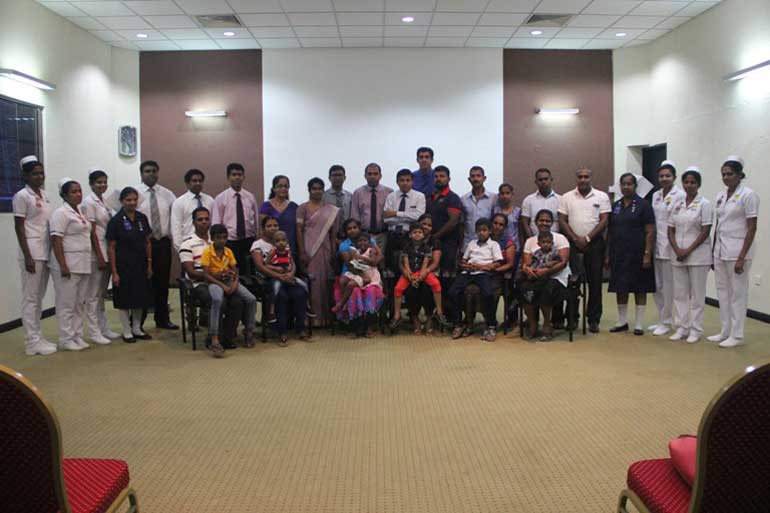Tuesday Feb 24, 2026
Tuesday Feb 24, 2026
Monday, 4 July 2016 00:00 - - {{hitsCtrl.values.hits}}
 Nawaloka celebrated its successful 12th bone marrow transplant with the fortunate children and their families
Nawaloka celebrated its successful 12th bone marrow transplant with the fortunate children and their families
Pioneering private healthcare network, Nawaloka Hospital has achieved another landmark by successfully completing 12 bone marrow transplants. The hospital performed its first bone marrow transplant in 2014 in its self-contained unit, built exclusively for stem cell transplants for diseases such as thalassaemia and other hematologic malignancies. Sri Lanka’s first such BMT (Bone Marrow Transplant) Unit, installed in 2014, at a cost of over Rs. 100 million raises hope for patients suffering from diseases such as thalassaemia, who at the moment have to resort to seeking treatment abroad at phenomenal expenses.
The state-of-the-art unit uses HEPA-filtered, positive pressure rooms to ensure that the air which is circulated is filtered and contamination free. It is also equipped with a separate lab and cell processing unit. The latest addition, a stem cells Apheresis machine separates and collects cells from peripheral blood to be used in bone marrow transplants.
“Bone Marrow Transplant program is one of our latest technological achievements,” explained a hospital official. “Sri Lanka has a significant thalassaemia affected population. Thalassaemia can be cured with a BMT. Since this disease is diagnosed early childhood, it is gratifying to know that a transplant can offer a second chance in life. It is so rewarding to us personally as well as professionally to see these children pick up their lives and face the future with renewed vigour. It is heartening to see those lead normal lives once again.”
BMT team at Nawaloka comprise oncologists, haematologists, paediatricians, transfusion specialists, physicians and nursing professionals dedicated to providing the utmost in care to these patients who undergo a four-week isolated recovery period under strict sterile conditions.
Nawaloka Hospital’s BMT Unit is accredited to the international registry of DKMS (Bone Marrow Donor Program), an international organisation in Germany dedicated to the fight against blood cancer and blood disorders by creating awareness, recruiting bone marrow donors to provide a second chance at life, raising funds to match donor registration costs, supporting the improvement of therapies through research and supporting patients from day one of their diagnoses.
At present, 5% of Sri Lanka’s national budget is spent on treatment of thalassaemia which essentially are blood transfusions carried out regularly for the unfortunate awaiting transplants. Children diagnosed with thalassaemia require monthly blood transfusion with treatment starting as early as five months of age and lasting a life span. Blood transfusion costs rise significantly with age too. The prevalence of the affliction is presently at 3,000 with 500,000 identified ‘carriers’.
Total cost of treatment for a thalassaemic patient is approximately Rs. 17 million for injection medication. The Government spends approximately Rs. 6.5 million of the healthcare budget for treatments. About 80 patients a year go overseas for bone marrow transplant procedures; a relatively low number due to the inordinately high costs of such transplant.
Specialist Consultants have pointed out the benefit of bone marrow transplant over regular blood transfusions. There have been advancements in the treatment of cancer. A bone marrow transplant has less toxicity than earlier and has improved the quality of life for patients post treatment. BMT unit at Nawaloka Hospital can also treat conditions such as leukaemia, multiple myeloma, aplastic anemia and sickle cell anaemia with its highly advanced Hemato Oncology Department.